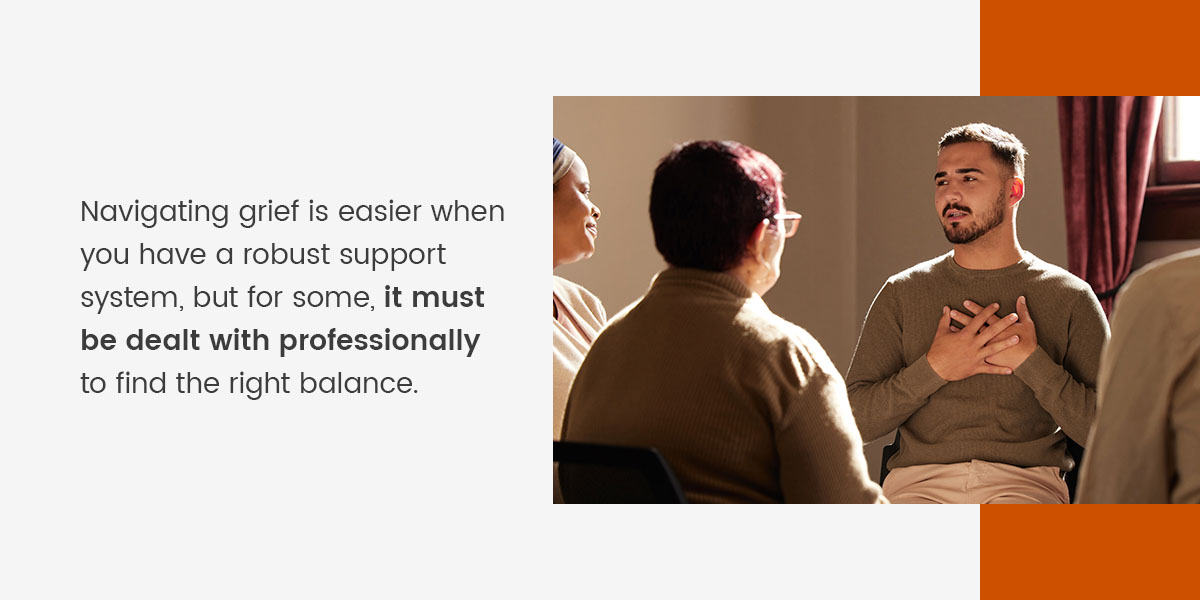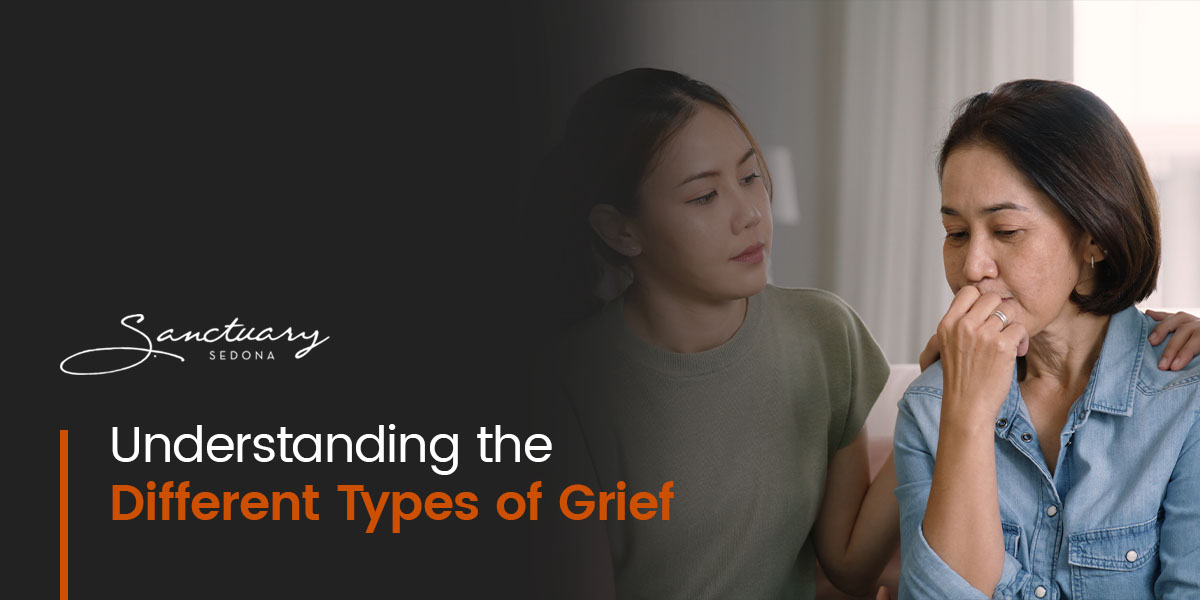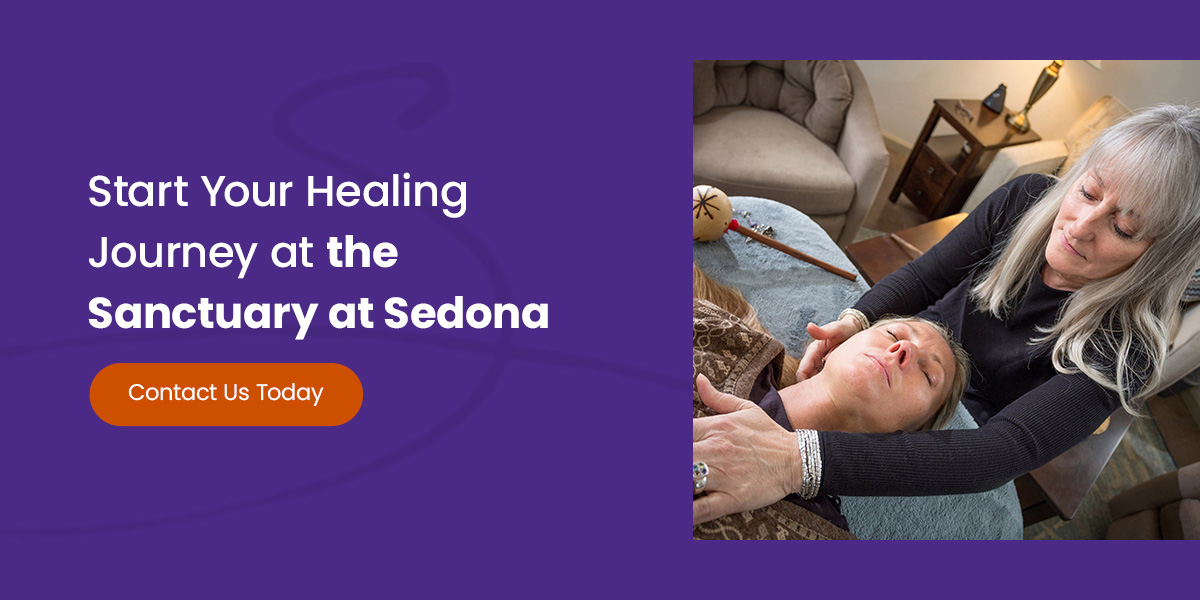Grief is an inevitable part of life we all experience at some point. The deep sense of loss associated with grief can trigger a myriad of unsought emotions. Comforting words can help ease the pain, yet you might still feel like you’re going through a traumatic experience alone.
The good news is that help is available. Qualified counselors equip you with the tools to help cope with the grieving process. Understanding the different types of grief puts things into perspective. This helps you identify the feelings and symptoms when they arise. We’ll discuss these, the stages and symptoms of grief and how you can get help.
What Is Grief?
You express grief after a traumatic loss, which usually prevents efficient daily functioning. The experience amplifies with an unexpected occurrence like death or retrenchment. Loss in any of the following instances may lead to grief:
- A family member, partner, friend or pet
- Divorce, longstanding friendship or long-term relationship
- A job or source of stable income
- Mobility, speech or other bodily impediments and health
- A home or housing unit
- Dreams, aspirations or goals
Everyone grieves differently. There is no singular way to cope with the overwhelming emotions. Identifying the types and stages of grief may help you understand and manage it.
What Are the Different Types of Grief?
The effects of grief can present physically, such as a change in behavior. Decreased social interaction or exhibiting excessive emotional trauma and conflict are also signs of grief. There is a multitude of channels used to express its impact.
Some common types of grief include:
Normal Grief
Losing someone or something close to you is devastating. Loss can trigger various uncontrollable reactions and emotions, whether intentional, by accident, or as a result of a tragedy. Normal grief is the most common and occurs after such a loss, regardless of the nature. Some reactions manifest physically, including:
- A tight chest that feels like you can’t breathe. It is often described as being similar to experiencing a panic attack.
- Weakness and lethargy with no desire to take part in any physical activities.
- Increased heartbeat out of nowhere, associated with a tight chest.
- Constant crying and tearfulness at random times.
- Nausea, shaking and vomiting.
You may display behavioral changes like anxiety, disorientation, confusion, a loss of focus, forgetfulness, aggression, agitation, and restlessness. In addition, you could experience some of these emotional reactions:
- Emotional numbness
- Listlessness
- Desolation
- Irritability
- Shock
- Rage
Many more behavioral and emotional changes and consequences of grief are recorded and vary between people based on their circumstances.
Delayed Grief
Delayed grief occurs long after the loss. At the time, you may have felt an intense pain that led you to disconnect from your surroundings due to denial. This non-acceptance of death is also known as disassociation. Life might have carried on, but over time, the feelings you suppressed might surface as physical, emotional, and behavioral reactions.
Persistent Grief
When any of the characteristic grief reactions are excessive and constant, it may be a sign you’re experiencing persistent or chronic grief. This form of suffering is deep-rooted and may be harder to cope with without professional intervention to uncover the cause of the severity. It can last for years, impact all life areas, and should be addressed once identified.
Accumulative Grief
This type of grief is the result of consecutive losses shortly after each other. It might not be death, but it could be the loss of a job or home after death or vice versa. Accumulative grief may be identified as “grief overload,” as it leads to an overwhelming sense of hopelessness and anguish. This grief type can be one of the worst to handle, but with an integrative holistic treatment approach, you can overcome it.
Secondary Loss
Losing one person or thing that’s extremely valuable can have a domino effect. It could lead to further losses as you struggle to pick up the pieces. Losses may include your home, job, friends, and other significant people due to a lack of proper coping mechanisms. Dealing with the initial loss effectively can help prevent secondary losses.
The Impact of Grief on Interpersonal Relationships
How you handle grief directly impacts those around you. Work and personal relationships may suffer if you don’t find the means to communicate your feelings and cope with those who care. Neglecting to maintain vital connections may lead to further breakdown and loss of these relationships, exacerbating the situation.
The effects of grieving may lead to the following social situations:
- Refusing to attend functions and remaining confined to one’s home or room.
- Developing an unhealthy dependency on one or more people.
- Grieving someone who is still alive after a divorce or breakup.
- Increased risk of self-harm and substance misuse.
- Neglecting self-care and overeating or starving.
- Withdrawing from friends and family.
- Inability to focus on work and tasks.
- Avoiding public events and spaces.
- Disengaging in social interactions.

Navigating grief is easier when you have a robust support system, but for some, it must be dealt with professionally to find the right balance.
What Are the Stages of Grief?
You’ll likely experience different stages of grief that may vary in duration and intensity. There are reportedly five stages people deal with as they try to cope:
- Denial: The loss may seem unreal as you struggle to accept reality.
- Anger: You may experience unjustified anger at a higher power, yourself, and others at this stage.
- Bargaining: Through bargaining, you may try to negotiate ways of dealing and coping with the loss while experiencing anger and denial.
- Depression: Feelings of depression are associated with the fourth stage of grief as the truth and reality slowly start settling in.
- Acceptance: Although the pain of loss lingers for a long time, you may finally start accepting it and find ways to move forward.
What Are the Symptoms of Grief?
With mourning symptoms, you may experience random, sudden changes in behavior or emotions. You may feel happy and like life is resuming, and a sudden picture, person or smell could trigger feelings of depression, instantly changing your mood. Some emotional, behavioral and physical symptoms you can anticipate include:
- Guilt for feeling relieved that you don’t have the responsibility of caring for someone with a terminal illness anymore or that you couldn’t mend a broken relationship with the deceased.
- Mixed emotions like sadness and relief at the loss, that they are in a better place despite your heartache.
- Physical afflictions like a weakened or compromised immune and nervous system.
- The inability to make decisions or think clearly in general.
- Extreme fatigue and lethargy or insomnia.
- A reduced or increased appetite.
Numerous other symptoms exist that differ from one person to the next. The critical part is admitting that it may be disruptive and finding ways to manage it.
How to Get Help for Grief
Acknowledging your feelings is one of the first steps towards healing during the grieving process. Approaching a friend, family member, or support group for help is an actionable measure, but getting expert help may be the best solution to cope with grief.
Research on the best treatment centers can help you find the perfect fit. Ensure they are reputable, established, and effective in every treatment they offer.
Contact The Sanctuary at Sedona for Holistic Non-12 Step Treatment
There’s no quick and easy way to deal with grief. Time is the best healer, but the proper treatment solution can help you gain the necessary closure. At The Sanctuary at Sedona, we believe in a holistic, non-12-step treatment approach that focuses on the underlying issues of grief and other trauma. By addressing and resolving the issue’s root, we can work towards healing the mind, body, and soul together.
If you’re interested in learning more about our treatment options, complete a contact request form.
He is the Founder, Administrator, Counselor at the Sanctuary at Sedona. He has a BA in Political Science and is currently Senior teaching staff at Four Winds Society, an international school of energy medicine. His credentials also include being an Ordained Minister; a Certified Shamanic Breathwork® Facilitator; a Founding Member Society for Shamanic Practitioners; a Member of Association for Comprehensive Energy Psychology; a Member of the National Institute for Holistic Addiction Studies. [email protected]


